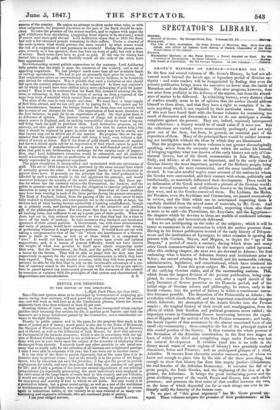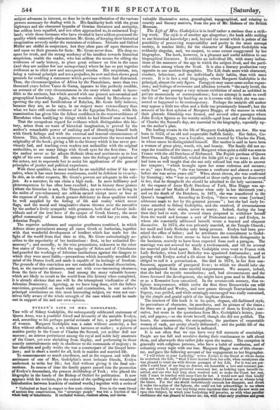SPECTATOR'S LIBRARY.
HISTORY,
History of Greece. By George Grote, Esq. Volumes Ill. IV Mertsee.
BIOGRAPHY,
The Lite of Mrs. Godolphin. By John Evelyn of Wootton Esq. Now first pub- llehed, and edited by Same: Lord Bishop of Oxford, Chancellor of the Most
Noble Order of the Garter. PicAersny. Flexion, Marmadute Herbert. or the Fatal Error; a Novel, reunited on Fact. By the
Countess of Blessingtou. In three volumes Ber4ley. The Jesuit at Cambridge. By Sir George Stephen. In two volumes Colaurn • GROTE'S HISTORY OF GREECE—VOLIIMES III IT.
INthe first and second volumes of Mr. Grote's History, he had not ad- vanced much beyond the heroic age, or legendary period of Grecian an- tiquity : and some readers will be disappointed by finding that even the present publication brings down the narrative no lower than the battle of Marathon and the death of Miltiades. This slow progress, however, does not arise from prolixity in the delivery of the matter, but from the abund- ance of matter to be delivered. In criticizing history, every distinct class of readers usually seem to be of opinion that the author should address himself to them alone, and that they have a right to complain if he in- serts anything which is not required by their particular tastes. Readers of this sort have found fault with the former volumes for containing too much of discussion and dissertation ; but we do not anticipate a similar complaint against the present. They are, indeed, copiously interspersed with reflections : a history would be of small value if it were not. But the reflections are varied; never unnecessarily prolonged; and not only grow out of the facts, but form, in general, an essential part of the exposition of them. Many of the principal facts would be neither interest- ing nor intelligible without the ideas by which they are illuminated. That the progress made in these volumes is not greater chronologically speaking, arises from the necessity under which the author felt himself of bringing together what was known of the early history not only of Con- tinental Greece, but of the Greek communities in Asia Minor, Italy, Sicily, and Africa; at all times an important, and in the early times of Grecian history the most important, portion of the Hellenic people, being the most wealthy, the most commercial, and the most intellectually cul- tivated. It was also needful togive some account of the nations by whom the Greeks were surrounded, and their contact with whom, politically and intellectually, so materially influenced their development. There could be no delineation of the Greek mind without a picture of the Grecian world; of the several countries and civilizations known to the Greeks, both as they were, and as the Greeks conceived them. The Lydians, the Medea, the Persians, even the Serbians and Cimmerians, are passed successively in review, and the little which can be ascertained respecting them la carefully distilled from the mixed mass of materials, by Mr. Gtots. And when he comes to nations really remarkable, respecting whom also there is more to be said—the Phcenicians, the Assyrians, and the Egyptians—. the chapters which he devotes to them are models of condensed informa- tion interestingly and instructively delivered.
But we are anticipating on the order of the subjects ; which it will be better to enumerate in the succession in which the author presents them. Having in his former publication treated of the early history of Pelopon- neaus and the institutions of Lycurgus, be takes occasion in opening the present with Corinth, Sicyon, and Megara, to depict the "age of the Despots," a period of nearly a century, during which those and many other Greek commonwealths were ruled by the usurpers called tyranni. After this striking chapter, the next two are devoted to Athena ; the first embracing what is known of Athenian history and institutions prior to Solon ; the second relating to Solon himself, and the memorable reforms, administrative, legislative, and constitutional, which have rendered his name immortal. From this great subject Mr. Grote passes to a survey of the outlying Grecian states, and of the surrounding nations. This, which forms the largest division of the present publication, being oom- pleted, he returns to Greece Proper; and, after a rapid sketch of the early literature of Greece posterior to the Homeric period, and of the initial stage of Grecian science and philosophy, he enters, early in the fourth volume, into the period of history in which a continuous narra- tive becomes possible. The despotism of the Pisistratithe at Athens ; the revolution which shook them off, and the important constitutional changes which followed; the absorption of the Asiatic Greeks into the Persian empire ; the tragical history of their revolt and resubjugation, from the effects of which their freedom and political greatness never rallied ; the important events in Continental Greece intervening between the expul- sion of Hippies and the arrival of the first Persian armament; and lastly, the heroic repulse of that armament by the almost unassisted force of one small city-community ; these complete the list of the principal topics of this second portion of the history. It thus contains the whole process of the formation of the Athenian constitution, in the first two stages at least, of which the third and completing stage under Pericles was but the natural development. It exhibits (and this is no trifle in the dreary moral waste of most regions of history) two genuinely exalted characters, Solon and Pittacus; and an anticipated glimpse of a third, Aristides. It rescues from obscurity another eminent man, of whom we know not enough to place him by the side of the three preceding, but enough to show that history has done him scanty justice--Cleisthenes, the real founder of the Athenian Democracy. It narrates the fall of a great people, the Ionic Greeks, and the beginning of the rise of a far greater, the Athenians. It brings the great barbarizing power and the great civilizing power of the world, Persia and Greece, into each other's presence; and presents the first scene of that conflict between the two, on the issue of which depended (as far as such things can ever be ra- tionally said) the futurity of the human race. To no part of "this great argument" has Mr. Grote proved-un- equal. These volumes surpass the promise of their predecessors: as his subject advances in interest, so does he in the manifestation of the various powers necessary for dealing with it. His familiarity both with the great highways and the obscurest bypaths of Grecian literature and antiquity, has seldom been equalled, and not often approached to, in unlearned Eng- land; while those Germans who have rivalled it have seldom possessed the quality which eminently characterizes Mr. Grote, of keeping their historical imagination severely under the restraints of evidence. Niebuhr and Otfried Milner are skilful in conjecture, but they often pace off upon themselves and upon us their guesses for facts : Mr. Grote never does. His deep re- spect for truth, and the strong tendency of his intellect towards historical scepticism, enable the reader, who has seldom the means for sifting the evidences of early history, to place great reliance on him in the cases (and they are neither few nor unimportant) where he has so put together evidences as to elicit new and unexpected results. His scepticism, too, being a rational principle and not a prejudice, he now and then shows good 'grounds for crediting a statement which previous writers had distrusted. Thus, the circumnavigation of Africa by the Pheenicians, more than two thousand years before Vasco de Gama, appears to him perfectly credible, on account of the very circumstances in the story which made it incre- dible to the ancients, but which accord with our present astronomical and geographical knowledge. Again, the wonders related by Herodotus re- specting the city and fortifications of Babylon, Mr. Grote fully believes, -because they are, as he says, in no respect more extraordinary than what we have still ocular evidence of in the Egyptian Thebes ; while his examination has given him the fullest confidence in the trustworthiness of Herodotus when testifying to things which he had himself seen or heard.
That the scrupulous regard for evidence which distinguishes this his- tory, arises from no want of historical imagination, is proved by the author's remarkable power of realizing and of identifying himself both with Greek feelings and with the external and internal circumstances of Greece. This indeed, is so conspicuous as to constitute the most marked originality of le book; giving a life to the history which it has never pre- viously had, and teaching even readers not unfamiliar with the original authorities, to see many things with Greek eyes for the first time. Yet the author never so far adopts Hellenic ideas and sentiments as to lose sight of his own standard. He enters into the feelings and opinions of the actors, not to supersede but to assist his applications of the general principles of justice and political experience.
With these qualities, he must indeed be an unskilful writer if his nar- rative, when it has once become continuous, could be deficient in vivacity. In this, as in other respects, Mr. Grote's powers are adequate to his sub- ject. As a narrator, he can claim a high rank. In mere brilliancy and picturesqueness he has often been excelled ; but in history these praises (where the historian is not, like Thucydides, an eye-witness, or living in the midst of eye-witnesses) are seldom earned except more or less at the expense of truth. A much greater deficiency in these qualities would be well supplied by the feeling of life and reality which never flags, and the moral and imaginative charm thrown over the narrative' by the author's lively sympathy with greatness, both that of heroic indi- - viduals and of the true hero of the epopee of Greek history, the most *gifted community of human beings which the world has yet seen, the Athenian People.
The superior nobleness and superior gentleness combined, in which Athens shone prOminent among all states Greek or barbarian, together with that wonderful development of intellect which has made her the light of the world from that time to this, Mr. Grote unhesitatingly as- cribes to the superiority of her institutions : first, to her unlimited De-
mocracy*; and secondly, to the wise precautions, unknown to the other free states of Greece, by which the sagacity of Solon and of Cleisthenes bad guarded the workings of Athenian institutions against the dangers to which they were most liable,—precautions which insensibly moulded the mind of the Demos itself, and made it capable of its heritage of freedom. The grounds of this conviction are not embodied in a formal dissertation, bat, as the narrative advances, come out with ever-increasing clearness. from the facts of the history. And among the many valuable lessons which are likely to result to the world from this history when completed, it is already obvious that one will be the triumphant vindication of the Athenian Democracy. Agreeing, as we have long done, with the fullest conviction, grounded on much study and examination, in our author's principal conclusions on this most interesting subject, we were not our- selves fully aware of the whole strength of the case which could be made out in support of his and our own opinion.

























 Previous page
Previous page